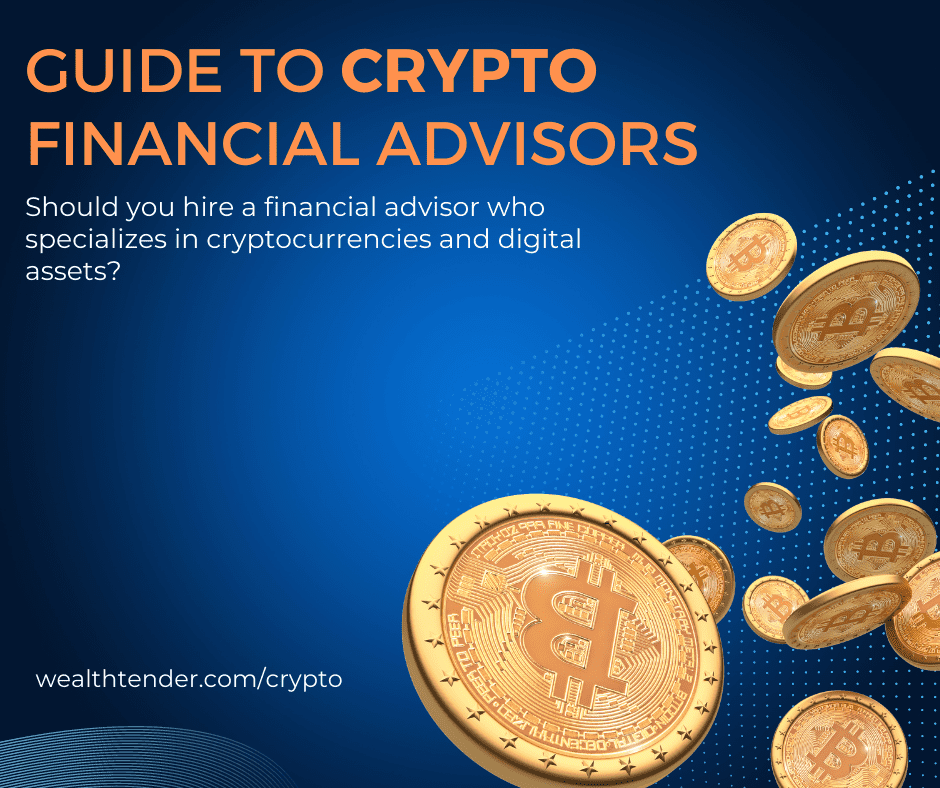To make Wealthtender free for readers, we earn money from advertisers, including financial professionals and firms that pay to be featured. This creates a conflict of interest when we favor their promotion over others. Read our editorial policy and terms of service to learn more. Wealthtender is not a client of these financial services providers.
➡️ Find a Local Advisor | 🎯 Find a Specialist Advisor

According to a recent Federal Trade Commission (FTC) report, consumers lost $139 million in cryptocurrencies in 2021 through scams conducted across numerous online dating sites, five times the level of prior year losses. As ownership of cryptocurrencies like Bitcoin and Ethereum increases among consumers, scams like these will continue to proliferate, putting your digital assets at risk.
Fortunately, you can substantially reduce the risk of losing money to cryptocurrency scams by following a few simple steps. If you’re among the millions of Americans who now own cryptocurrencies, these six tips will help you protect your digital assets and avoid losing money to scammers.
1. Perform Your Own Due Diligence
High-profile celebrities and sports figures often receive sizable payments for promoting a particular cryptocurrency. Don’t let their level of influence sway your decision without doing your own research.
Like any investment, trusting a so-called expert is often a risky move—particularly in an emerging asset class like digital currencies. Instead, look for unbiased sources of information and reputable research outlets offering clear risk and reward guidance.
2. Protect Your Virtual Wallet
Consumers with crypto assets should take cautionary steps to keep their virtual wallets safe. There are horror stories among investors who lost access to their digital wallets. Never share your private key or seed phrase with anyone. You can even take an added security step by storing that personal information offline. Use multi-factor authentication whenever possible to reduce the risk of becoming the next victim of virtual wallet larceny.
3. Watch Out for Phishing Activity
Social engineering scams are another common way hucksters look to seize your crypto tokens. With phishing attempts, scammers target crypto holders and their online wallets. Scammers sometimes send emails with links to fraudulent websites where they hope you will enter your private key information. From there, the hackers have access to all the cryptocurrencies of the victim.
Phishing is among the most prevalent types of attacks in this digital age, and now it has become a significant risk for holders of crypto assets. Be sure to read the URL to ensure it is a legitimate website.
Some phishing scams will try to be slick by changing one or two characters of a web address to make it still look legitimate. Another tip to reduce your chance of getting caught in a phishing scam is to have a good anti-virus program on your computer.

4. Ask Yourself: Is it Too Good to be True?
How often do you see online ads pitching giveaway promotions that sound too good to be true? Fraudsters often claim to be celebrities or social media influencers to lure unsuspecting crypto holders.
A typical scam may work like this: The scammer purports to offer free tokens to anyone who sends them money. But first, they instruct you to send crypto tokens to them to participate. Don’t fall for this common trap. Be sure to research any offer you come across and use common sense with a healthy dose of skepticism.
5. Report Instances of Extortion
Email phishing, blackmail, and extortion are other typical social engineering scams. In some cases, the fraudster might claim to have damaging information on the potential victim—perhaps a record of crime or unflattering internet searches. They use these threats to blackmail consumers into sending crypto as a type of bribe.
You can help others avoid crypto scams by raising the red flag and reporting suspicious activity to the FTC by visiting this website: https://reportfraud.ftc.gov/.
6. Know the Types of Investment Swindles
Have you heard about exit scams and rug pulls? These are real threats to crypto investors. An exit scam occurs when a firm raises money through an initial coin offering (ICO) but disappears with investors’ money. For example, in an infamous 2017 case, a crypto start-up named Confido vanished with $375,000 of ICO proceeds.
The latter type of con known as a rug pull occurs when bad actors manipulate a token’s market price and then abandon it as an investment project leaving investors with nothing. A classic rug pull took place in Nov. 2021 with Squid Coin. In that series of events, the token’s market price dropped from nearly $3,000 to almost zero as its creators quickly exchanged the coins for cash.
Ryan Firth, a cryptocurrency financial advisor based in Houston, Texas encourages consumers to read the white paper for any crypto project they consider investing in and confirm if the crypto’s source code has been audited. “At the end of the day, when it comes to crypto, investors should never put capital at risk that they can’t afford to lose,” Firth said.
7. Hire a Crypto Financial Advisor
Consider hiring a financial advisor who understands the opportunities and risks of investing in cryptocurrencies to help you make more informed decisions with your money.
A growing number of financial advisors have earned advanced designations to demonstrate their knowledge and commitment to helping clients invest in blockchain-related investments. Two credentials to look for in an advisor are the Certified Digital Asset Advisor (CDAA) and Certificate in Blockchain and Digital Assets (CBDA).
These relatively new qualifications cover several of the critical aspects of the asset class, including blockchain technology and decentralized finance. The qualifications give investors assurance that the advisor has a high level of knowledge of cryptocurrency and can speak with authority.
A referral from a friend already working with a knowledgeable advisor could be helpful or consider using the Wealthtender directory of crypto financial advisors to begin your search online. Many financial advisors can meet with you online, so you can expand your search to include advisors nationwide. You can also refer to these questions to learn if a financial advisor understands cryptocurrencies.
Finally, a recent announcement by Fidelity Investments means you could soon be able to invest in Bitcoin through your 401(k) plan. This could prove to be the best way to avoid a scam, assuming you work for a reputable employer working with an established 401(k) plan provider.
The Bottom Line
Many investors want exposure to the cryptocurrency market as the popularity of this asset class grows. Unfortunately, criminals have learned how to exploit vulnerabilities among consumers investing in crypto.
By taking cautionary steps to avoid crypto scams combined with a dose of common sense, you can avoid becoming a statistic and protect your digital assets from the unscrupulous acts of fraudsters.
Are you ready to enjoy life more with less money stress?
Sign up to receive weekly insights from Wealthtender with useful money tips and fresh ideas to help you achieve your financial goals.

About the Author
Mike Zaccardi, CFA
Mike is a freelance writer for Wealthtender, financial advisors, and investment firms. He’s a CFA® charterholder and Chartered Market Technician®, and has passed the coursework for the Certified Financial Planner program. Learn More About Mike
To make Wealthtender free for readers, we earn money from advertisers, including financial professionals and firms that pay to be featured. This creates a conflict of interest when we favor their promotion over others. Read our editorial policy and terms of service to learn more. Wealthtender is not a client of these financial services providers.
➡️ Find a Local Advisor | 🎯 Find a Specialist Advisor





